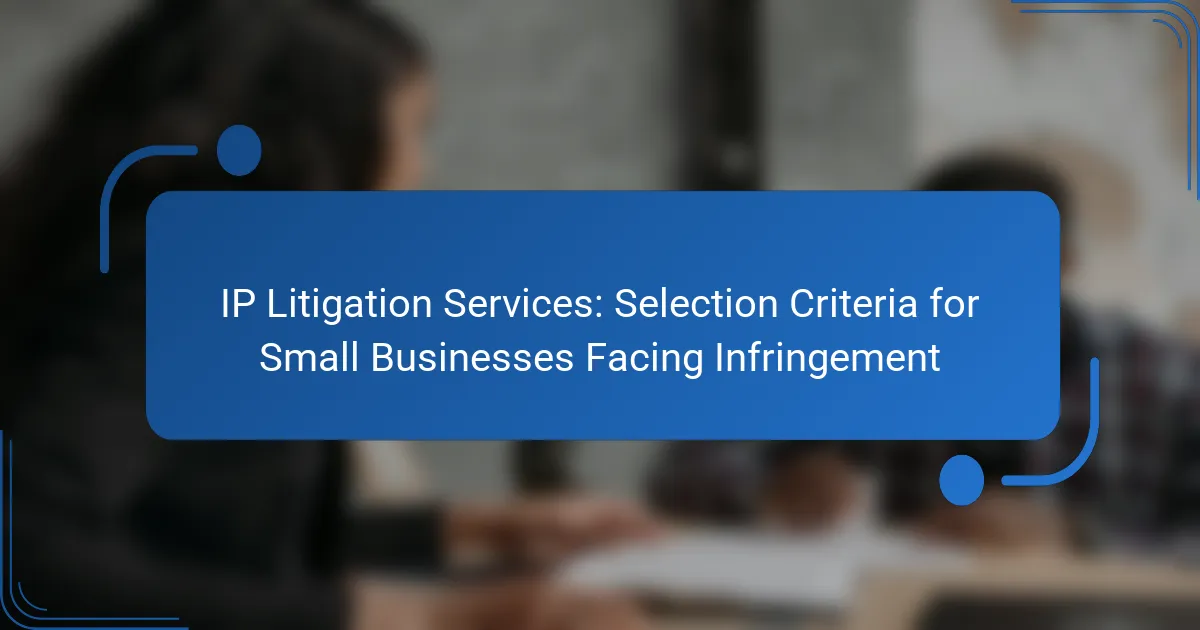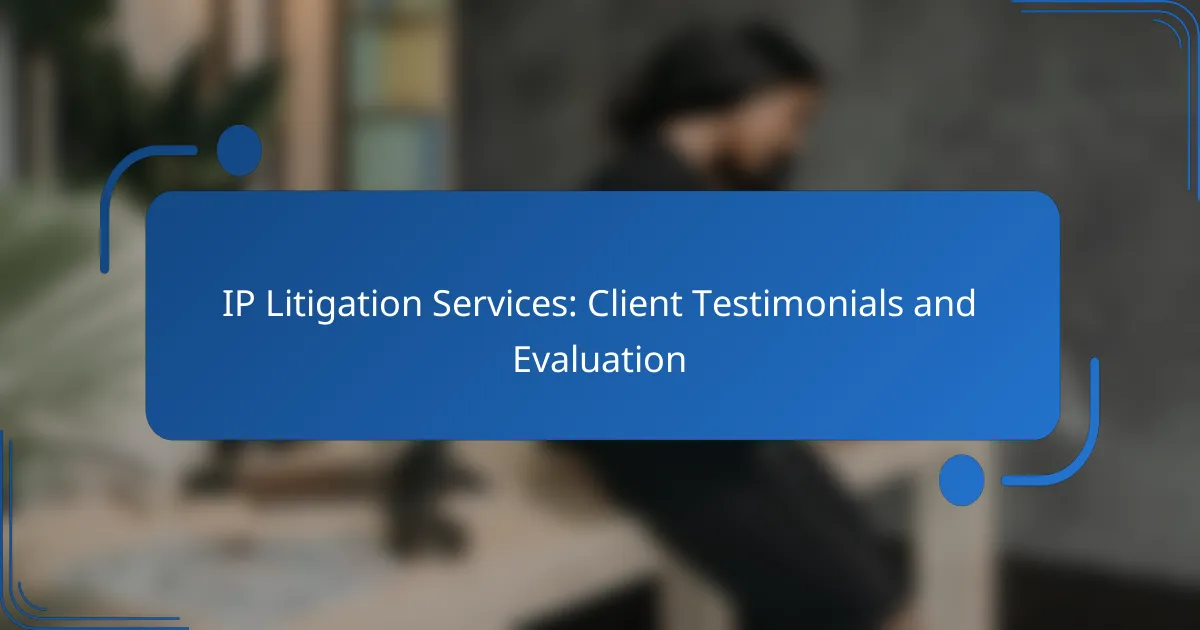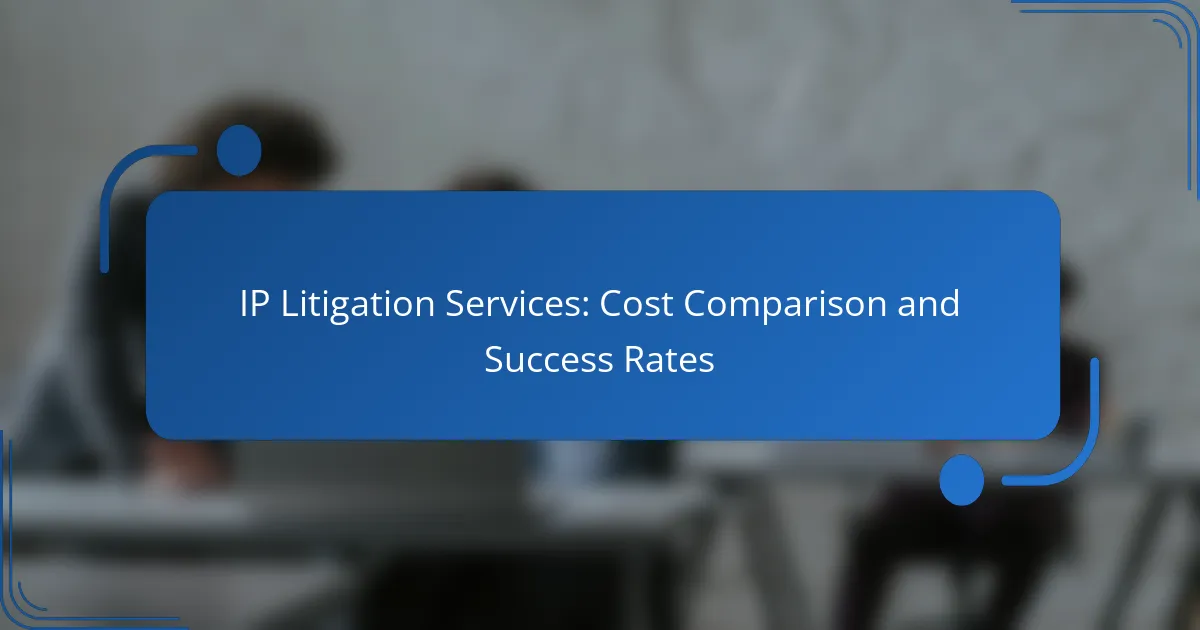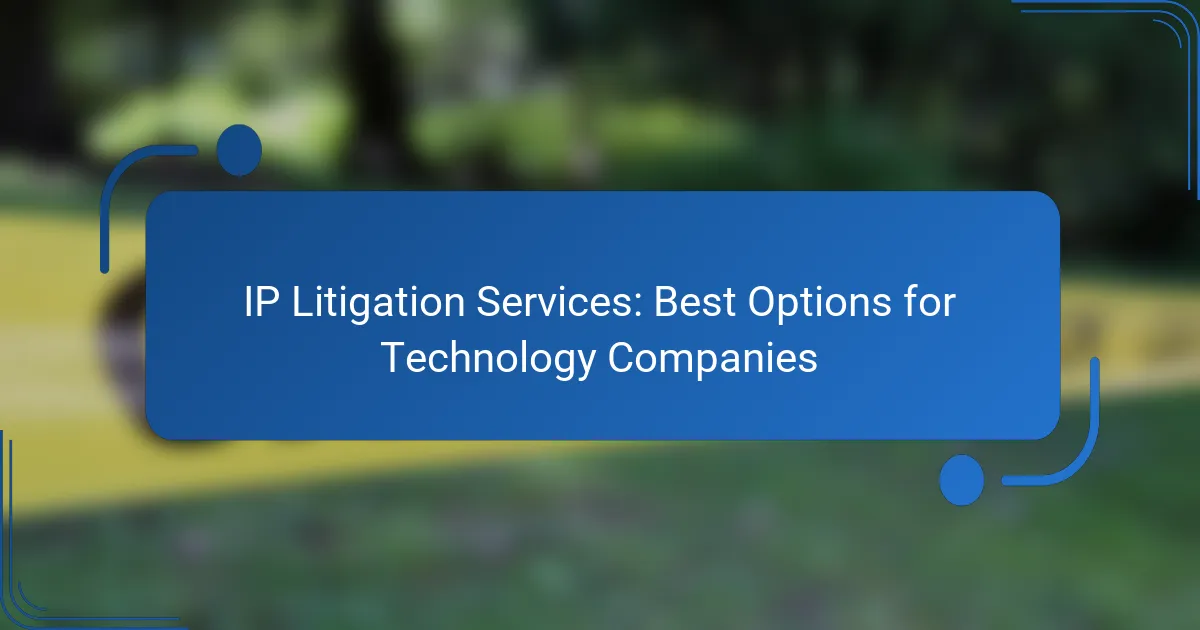Small businesses encountering intellectual property (IP) infringement can greatly benefit from specialized litigation services designed to safeguard their innovations and brand identity. When selecting an IP litigation service provider, it is essential to consider factors such as industry experience, success rates, and client feedback to make an informed choice that aligns with your business needs.
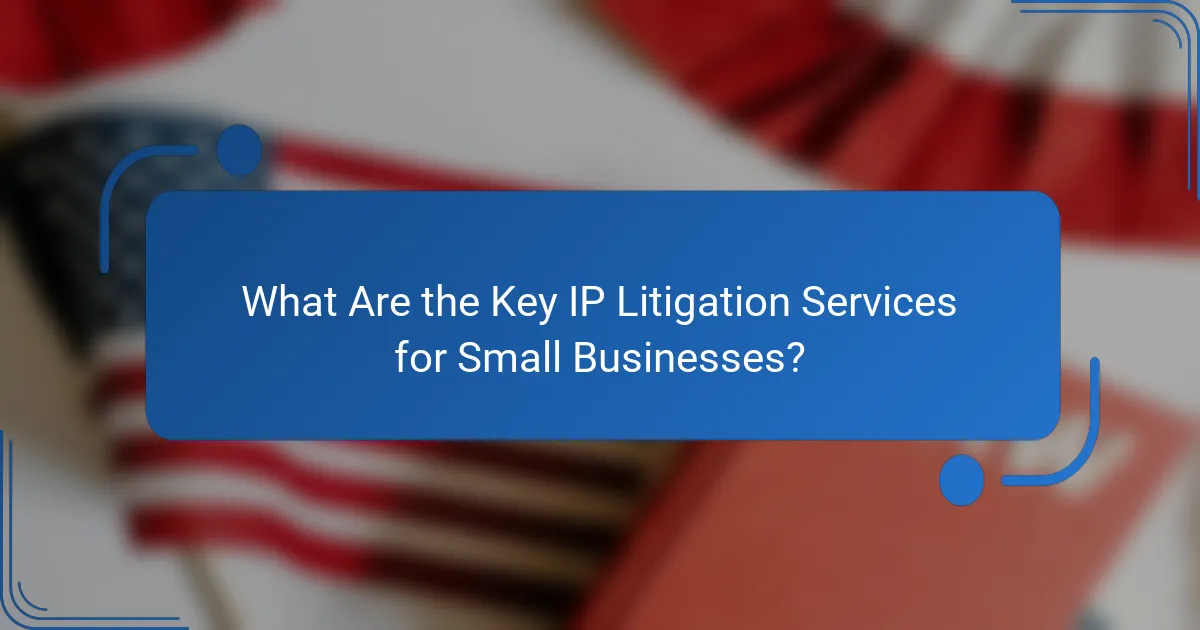
What Are the Key IP Litigation Services for Small Businesses?
Small businesses facing intellectual property (IP) infringement can benefit from several key litigation services tailored to their needs. These services help protect their innovations, brand identity, and creative works while navigating the complexities of IP law.
Patent litigation support
Patent litigation support involves legal assistance in defending or enforcing patent rights. Small businesses should consider hiring attorneys who specialize in patent law to help them navigate the litigation process, which can include filing lawsuits, responding to infringement claims, and negotiating settlements.
When selecting patent litigation support, look for firms with experience in your industry and a track record of successful outcomes. Costs can vary widely, so be prepared for potential legal fees in the low tens of thousands of dollars, depending on the complexity of the case.
Trademark enforcement services
Trademark enforcement services help small businesses protect their brand names, logos, and other identifiers from unauthorized use. This can include monitoring for potential infringements, sending cease-and-desist letters, and pursuing legal action if necessary.
Effective trademark enforcement often requires a proactive approach. Small businesses should regularly monitor their trademarks and consider registering them with the U.S. Patent and Trademark Office (USPTO) to enhance protection. Budgeting for enforcement actions can range from a few hundred to several thousand dollars, depending on the scope of the issue.
Copyright infringement litigation
Copyright infringement litigation involves legal action against those who unlawfully use a business’s creative works, such as written content, music, or software. Small businesses can seek legal counsel to assess the infringement and determine the best course of action, which may include negotiation or court proceedings.
To strengthen their position, small businesses should maintain clear documentation of their original works and registration with the U.S. Copyright Office when applicable. Legal costs for copyright litigation can vary significantly, often starting in the low thousands and increasing based on the case’s complexity.
Trade secret protection
Trade secret protection services focus on safeguarding confidential business information, such as formulas, practices, or processes that provide a competitive edge. Small businesses should implement non-disclosure agreements (NDAs) and other security measures to protect their trade secrets from unauthorized disclosure.
In the event of a breach, legal action may be necessary to enforce trade secret rights. Small businesses should consult with legal experts to understand the best practices for maintaining trade secrets and the potential costs associated with litigation, which can vary based on the severity of the infringement.
Licensing negotiation assistance
Licensing negotiation assistance helps small businesses navigate agreements that allow others to use their IP while retaining ownership. This service is crucial for monetizing patents, trademarks, or copyrights without relinquishing control over the IP.
When engaging in licensing negotiations, small businesses should seek legal counsel to ensure favorable terms and compliance with relevant laws. Licensing agreements can vary widely in terms of royalties and duration, so it’s essential to have a clear understanding of the potential financial implications before proceeding.
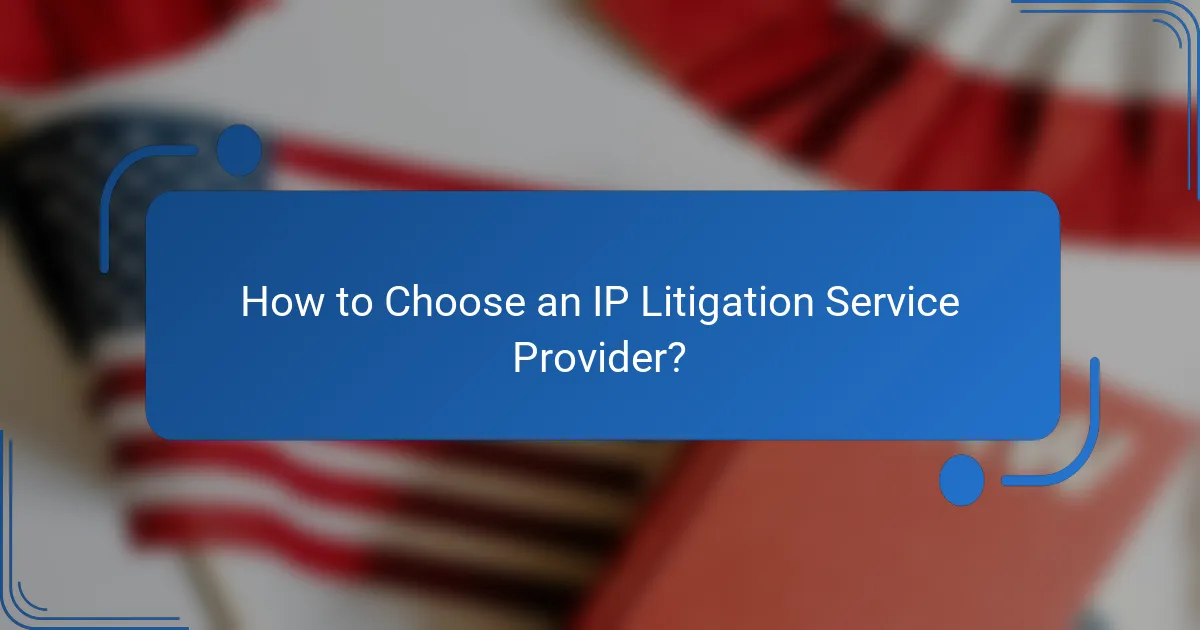
How to Choose an IP Litigation Service Provider?
Selecting an IP litigation service provider is crucial for small businesses facing infringement issues. Focus on their industry experience, success rates, client feedback, and fee structures to ensure you make an informed decision.
Experience in relevant industry
When choosing an IP litigation service provider, prioritize those with experience in your specific industry. They will have a better understanding of the unique challenges and nuances associated with your sector, which can significantly impact the outcome of your case.
For example, a provider with a background in technology may be more adept at handling software patent disputes than one with a focus on consumer goods. Look for firms that have successfully navigated similar cases in your field.
Success rate in similar cases
Assessing the success rate of potential IP litigation service providers is essential. A high success rate in cases similar to yours indicates their capability and effectiveness in achieving favorable outcomes.
Request statistics or case studies that demonstrate their track record. Aim for providers with a success rate above 70% in cases like yours, as this can give you confidence in their ability to represent your interests effectively.
Client testimonials and reviews
Client testimonials and reviews provide valuable insights into the quality of service offered by IP litigation providers. Look for feedback that highlights their communication, responsiveness, and overall satisfaction from previous clients.
Consider checking independent review platforms or asking for references from the provider. Positive testimonials can indicate a reliable partner, while negative reviews may signal potential red flags.
Fee structure and transparency
Understanding the fee structure and ensuring transparency is vital when selecting an IP litigation service provider. Different firms may offer various billing methods, including hourly rates, flat fees, or contingency arrangements.
Request a detailed breakdown of costs and any potential additional fees. Aim for providers who are upfront about their pricing and willing to discuss payment options that align with your budget, as this can prevent unexpected financial burdens during litigation.
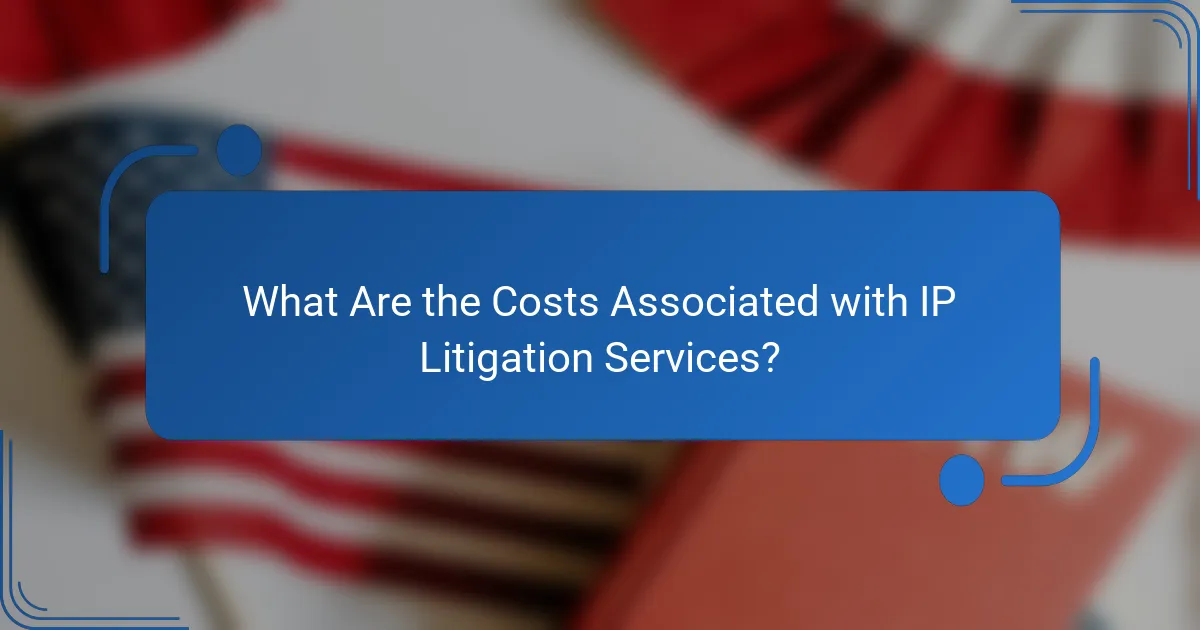
What Are the Costs Associated with IP Litigation Services?
The costs associated with IP litigation services can vary significantly based on factors such as the complexity of the case, the attorney’s experience, and the specific services required. Small businesses should be prepared for a range of expenses, including attorney fees, court costs, and potential settlement amounts.
Hourly rates of attorneys
Hourly rates for attorneys specializing in intellectual property litigation typically range from low hundreds to over a thousand USD per hour, depending on their expertise and location. For small businesses, it’s crucial to assess the attorney’s experience and track record in IP cases to ensure that the investment aligns with the potential outcomes.
Consider negotiating a capped hourly rate or a retainer agreement to manage costs effectively. Always clarify billing practices upfront to avoid unexpected charges.
Flat fees for specific services
Some IP litigation services may be offered at flat fees, which can provide predictability in budgeting. For instance, filing a trademark application or conducting a patent search might be available for a set price, often ranging from a few hundred to several thousand USD.
When considering flat fees, ensure that the scope of services is clearly defined. This helps prevent additional charges for services that may be necessary but were not included in the initial agreement.
Potential additional costs
In addition to attorney fees, small businesses should anticipate potential additional costs such as court filing fees, expert witness fees, and costs related to discovery processes. These expenses can add up quickly, often reaching thousands of USD, depending on the case’s complexity.
To mitigate unexpected costs, maintain open communication with your attorney about potential expenses and consider setting a budget for the litigation process. This proactive approach can help manage financial risks associated with IP litigation.
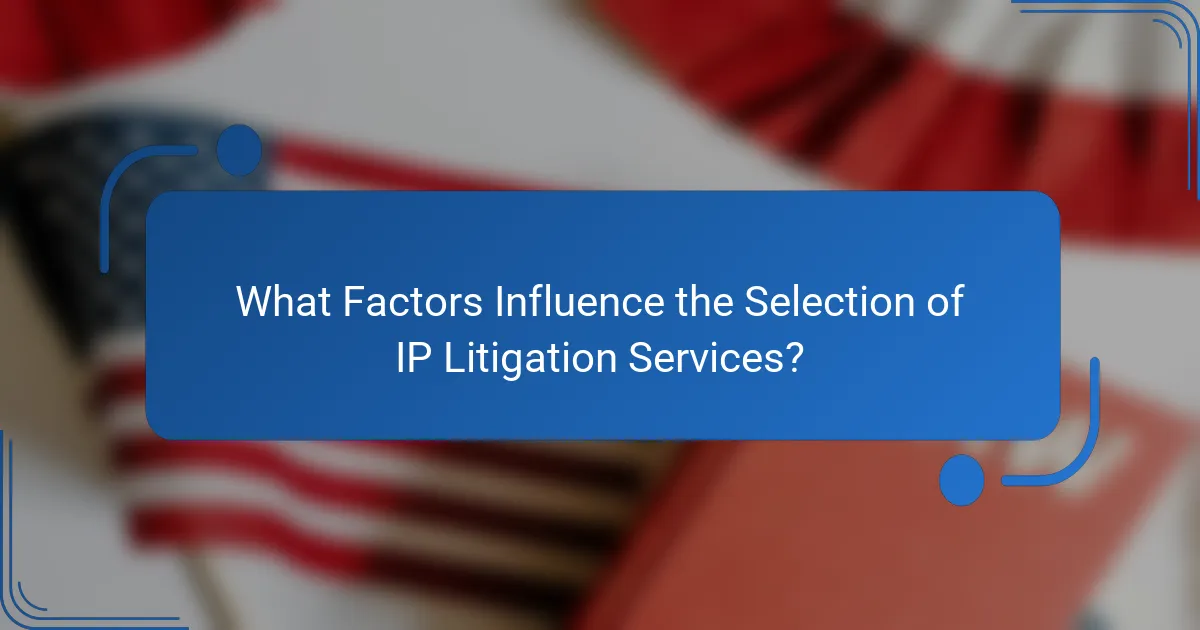
What Factors Influence the Selection of IP Litigation Services?
When selecting IP litigation services, small businesses must consider various factors that directly impact their ability to effectively address infringement issues. Key considerations include the nature of the infringement, geographic jurisdiction, and the size and resources of the business.
Nature of the infringement
The type of intellectual property infringement significantly influences the choice of litigation services. Different types of IP, such as patents, trademarks, and copyrights, require specialized legal expertise. For example, patent litigation often involves complex technical details, while trademark disputes may focus more on brand reputation.
Additionally, the severity and scope of the infringement should be assessed. A small-scale infringement may be resolved through negotiation or alternative dispute resolution, while larger cases may necessitate full litigation. Understanding the nature of the infringement helps businesses align with attorneys who have relevant experience.
Geographic jurisdiction
Geographic jurisdiction plays a crucial role in IP litigation, as laws and regulations vary by region. Small businesses must identify where the infringement occurred and where the infringing party operates. This can affect the choice of legal representation, as attorneys must be licensed to practice in those jurisdictions.
For instance, if a business is facing infringement in the European Union, it may need to engage a lawyer familiar with EU regulations and the European Court of Justice. Understanding jurisdictional nuances can help businesses avoid costly legal missteps and ensure effective representation.
Size and resources of the business
The size and resources of a small business are critical factors in selecting IP litigation services. Smaller companies may have limited budgets, which can influence their choice between pursuing litigation or settling disputes. It’s essential for these businesses to evaluate the potential costs of litigation, including attorney fees, court costs, and the time involved.
Moreover, businesses should consider their internal capabilities for managing litigation. If resources are scarce, it may be beneficial to seek firms that offer flexible payment structures or alternative fee arrangements. This approach can help mitigate financial strain while ensuring access to competent legal representation.
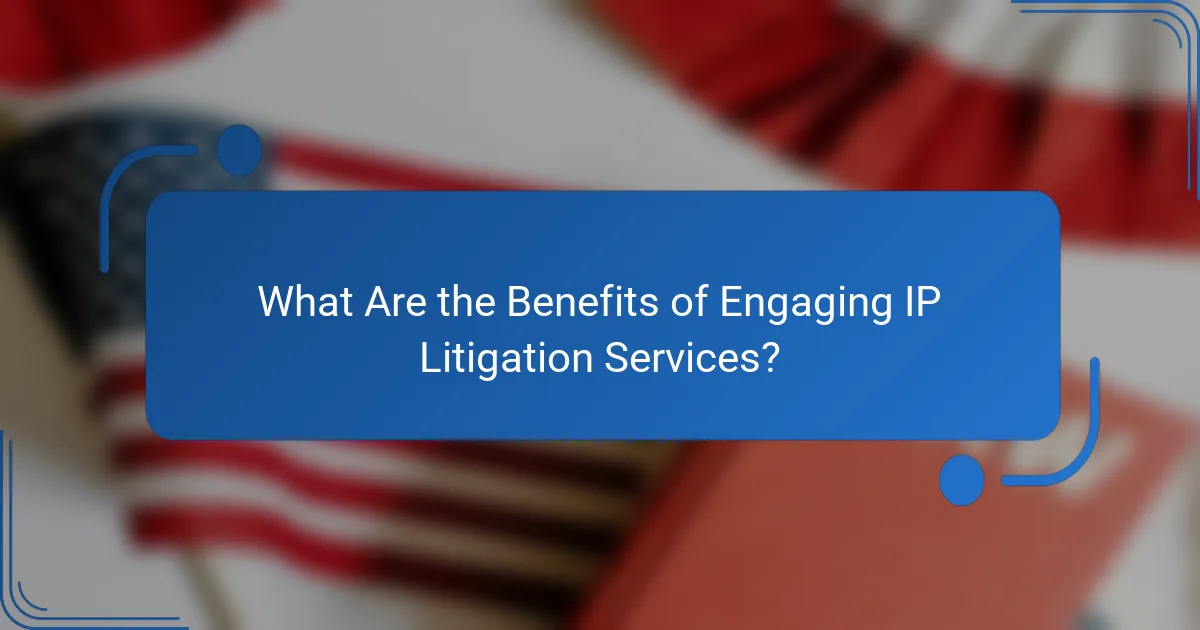
What Are the Benefits of Engaging IP Litigation Services?
Engaging IP litigation services offers small businesses crucial advantages when facing infringement issues. These services provide expert support in navigating complex legal landscapes, ensuring that businesses can protect their intellectual property effectively and efficiently.
Expert legal guidance
Expert legal guidance is essential for small businesses involved in IP litigation. Experienced attorneys can help identify the most effective strategies for protecting intellectual property rights and navigating the intricacies of the legal system. This guidance is particularly important when assessing the merits of a case and determining the best course of action.
When selecting legal counsel, consider their track record in IP cases similar to yours. Look for firms with experience in your industry, as they will be more familiar with the specific challenges and regulations that may apply. Additionally, ensure that the attorney has a solid understanding of both state and federal IP laws.
To maximize the benefits of expert legal guidance, maintain open communication with your attorney. Provide them with all relevant information and documentation to facilitate a thorough understanding of your case. Regular updates and discussions can help ensure that your legal strategy remains aligned with your business goals.
